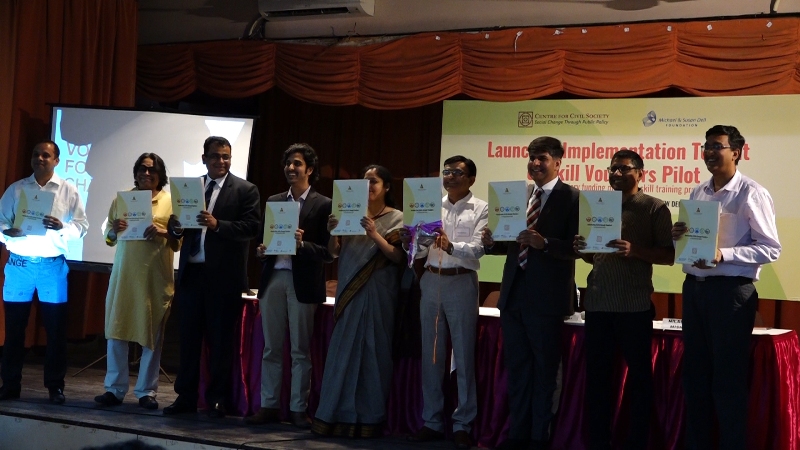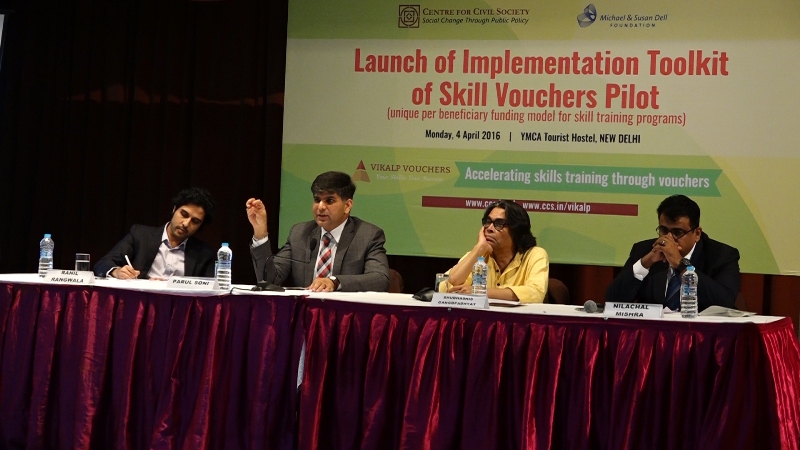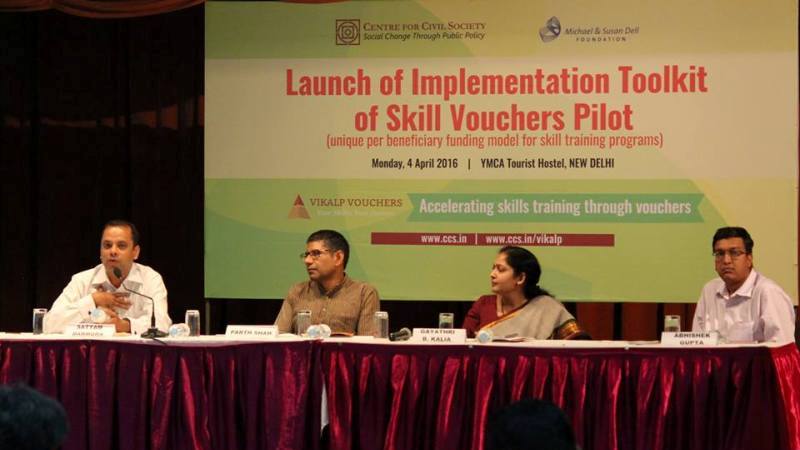VIKALP: Accelerating skills training through voucher
Launch event of Implementation toolkit of Skill Voucher Pilot

4 April 2016, New Delhi: Centre for Civil Society (CCS) in 2012 conceptualized the use of vouchers for skill training to provide marginalized youth with access to a career of their choice and improve the accountability of training institutes. CCS started ‘Vikalp’ which was supported by Babasaheb Ambedkar Research & Training Institute (BARTI), Pune, an autonomous body under Department of Social Justice and Special Assistance (DSJSA), Maharashtra, National Skill Development Corporation (NSDC) and Michael & Susan Dell Foundation (MSDF) and India Development Foundation (IDF) as a third party impact evaluation partner.
The three year pilot at Mumbai and Pune has demonstrated phenomenal results:
- A total of 2,000 youth have been trained.
- An astounding 5,100 Scheduled Caste (SC) youth attended 55 career awareness melas, the unique mobilisation and career counselling platform. The impact evaluation conducted by IDF clearly established the merits of the model.
CCS organized a workshop on 4th April 2016 at New Delhi to disseminate the learning of the pilot and initiate the process of providing technical assistance and knowledge partnership to the agencies interested in replicating the skill voucher model. As part of the event, there were theme-based panel discussions also.
Panel I: Alternate Financing Models for sustainability of skill development sector chaired by Rahil Rangwala, Director - Family Economic Stability, Michael & Susan Dell Foundation.
 |
- Theme 1: Sustainability of grant based funding models by Parul Soni, Managing Partner of Thinkthrough Consulting (TTC). He discussed the benefits of considering all options of funding and reforming the current system of funding which is dependent only on one of the three: Government, Corporate or Non-Profit Foundations.
- Theme 2: Use of skill vouchers for creating demand of skill development by Subhashish Gangopadhyay, Research Director, India Development Foundation. He talked about two kinds of demand: 1) Demand for skilled labour; 2) Demand for skill development. Speaking on the funding model, he said, the cost of producing skill should be lower than the value created by the skill. He also talked about demand-driven models of skill development and creating accountability among employers.
- Theme 3: Creating an enabling environment for skill loans by Nilachal Mishra, Partner - Government and Infrastructure Services at KPMG. In this thematic discussion, the speaker highlighted the importance of skilling people below 25 years of age, currently accounting for 54% of India’s total population. He spoke about the non-sustainability of grant-based models as free of cost trainings are not valued by beneficiaries and thus, create inefficiencies.
Panel II: Overcoming Impediments to the growth of skill development sector chaired by Parth J Shah, President, CCS. He said that every stakeholder in the system needs to be analyzed carefully through a framework of three which is:
 |
- What are their interests?
- What are their incentives?
- How much access to information do they have?
- Theme 1 - Creating aspirations among the youth for skill development by Satyam Darmora, Founder i2e1 and former Director Family Economic Stability at Michael & Susan Dell Foundation. His discussion was around the demand and supply mismatch in the industry. He elaborated on how the EWS demand jobs that enable them to improve their status and standard of living: for instance: they value desk jobs in a good environment over a sales job. He said “Businesses don’t create models because skilling is seen as a sector for the poor who can only sustain low levels of lifestyle.”
- Theme 2 - Adoption of nationally acceptable standards for quality framework by Gayathri B Kalia, Chief Operating Officer, Deen Dayal Upadhyaya Grameen Kaushalya Yojana (DDU-GKY) Ministry of Rural Development (MoRD). DDU-GKY is a pioneer in the skill development sector and has significantly contributed to the skill development policy in the country. She identified some of the key challenges of the industry:
- Continuing a job is one of the major problems among the disadvantaged youth in rural India.
- Diversity and autonomy for service providers has led to diversity in quality (infrastructure/time period, etc.) and consequently, has lowered the skilling standards.
- Standards can be ensured by keeping track of quality of service providers.
- Requirement of soft skills to enthuse the youth and remove low social status of traditional vocations.
- Performance-based multi-payment loans as a means to improve the quality of service providers and the motivation levels of students.
- To get industries to provide an environment for improving skills.
- Theme 3: Enabling synergies among different stakeholders by Abhishek Gupta, Advisor to Delhi Govt. on Skill Development and Lead, Corporate Programs at Skills Academy. He discussed how the skill development institutions are scattered across ministries and states, leading to lack of synergies and inefficient governance. He also focused on encouraging self-employment; however, it makes the verification of employment difficult post skilling. He recommended decentralization of demand-supply match, possibly through Mohalla Sabhas.
Media coverage:
- प्रशिक्षण और रोजगार के बीच का अंतर खत्म हो, अमर उजाला
- ट्रेनिंग और जॉब के बीच की दूरी भरें, नवभारत टाइम्स
- प्रशिक्षण व रोजगार के बीच के अंतर को पाटना जरूरी, राष्ट्रीय सहारा
For more information click here!
Catch glimpse of VIKALP event 2016 on Facebook here.
You can find what all people talked about the conference on Twitter by searching with #VIKALPVouchers

